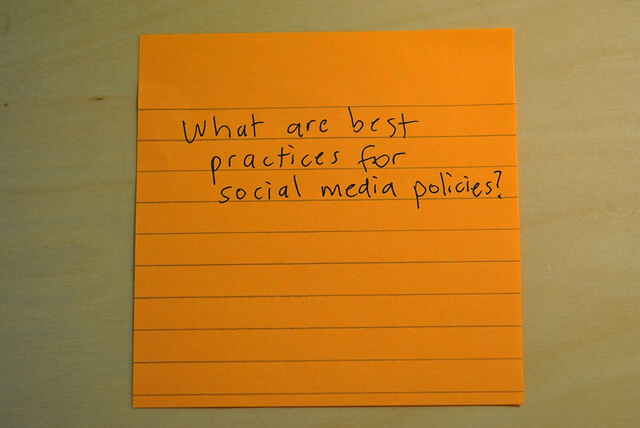A couple of weeks ago, smartie Kerry Gorgone wrote a blog post about whether you should friend your employees on the social networks.
I have a hard time with this one for two reasons: 1) I met every one of our employees through the social networks first, which means we were friends there before they started working here; and 2) Social media is part of what we do so there is a big blurry line between personal and professional in this case.
Right now, it’s probably okay (I say probably because they may tell you differently), but as we continue to grow, this may be something I need to keep in mind. It might not be okay to be friends with all of our employees on the social networks.
That’s why a social media policy is so important.
Right now, our policy pretty much is, “Don’t swear” and “Consider the optics.”
But, as we continue to add to our team, the policy will have to evolve.
The Legal Ramifications
Peter Fischer, an attorney at Stokes Roberts & Wagner, says it’s best to have a policy with a signature line on it where employees put their John Hancock.
In accordance with National Labor Relations Board laws, he recommends the following:
- Employers cannot restrict anyone from commenting on his or her work life.
- Employers can make sure employees sign confidentiality provisions.
- Employees can’t lie.
There aren’t clear cut laws (yet) on what can and can’t be said by employees—or how employers react—on the social networks.
That said, if a group of employees complains about a policy or procedure on their personal Facebook pages, the NLRB allows that. But, if a single employee posts something harmful to the company, the employer has more rights.
Inside my communications firm, if someone posts something that may leave the wrong impression, I’ll bring it up and ask them to consider how someone who might not work here would read that.
It doesn’t happen often, but I like them to think about the perception they’re leaving.
Then it’s up to them to either edit, delete, or just keep it in mind for next time.
The Social Media Policy
Part of the reason many organizations don’t have a social media policy is because they approach it from a legal standpoint and it becomes this long drawn-out thing.
It doesn’t have to be.
It should include:
- State where you work and, if you’re distributing content for a client, make that clear.
- Don’t lie.
- Be meaningful and respectful. Don’t spam or argue.
- Use common sense and common courtesy. If in doubt, don’t post.
- Stick to areas of expertise.
- Do offer insight and wisdom, but don’t provide any confidential information.
- Don’t swear.
- Be polite. Don’t be antagonistic.
- Do not comment on any legal matters or litigation.
- If the topic is one of crisis, do not comment.
- Google has a long memory. Be smart about what you post.
- Don’t post about competition unless you have written consent from them to do so.
- Don’t post about the company or our clients without authorization.
- Be transparent.
- Always, always, always disclose any freebies you’ve received or anything you’re getting paid to post about.
- If you use social media on behalf of clients, please double check you’re updating from the correct account.
- Don’t ever, ever leak confidential work information to the social networks, to bloggers, or to the media.
- Keep the line between personal and business as clear as possible.
- Be kind to your colleagues and peers.
- If you’re posting from company-provided technology or on company time, you can have no expectation of privacy.
- Don’t be stupid.
There are Consequences
Two days ago, Business Insider released an internal LinkedIn document that describes, in detail, how they are going to become a $1 billion company.
On every page of that document, it says, “Do not share externally,” “For internal LinkedIn only. Do not distribute or discuss outside of LinkedIn,” and “Everything on this page is strictly confidential. Do not share this information externally under any circumstances.”
And yet…
If the social media policy is violated (see #17 in this case), there will be consequences, which could include termination.
(As a business owner, I might commit murder if someone distributed something like this externally.)
Every employee must sign the policy and that creates a binding contract.
If you need help, there is a directory of social media policies already written and legally approved that you can use for your templates.
What else do you think should be included in a social media policy?
